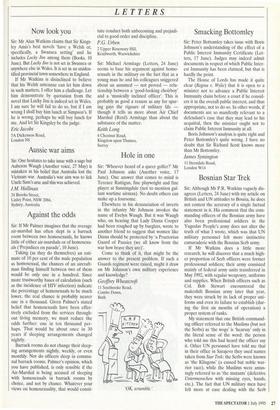Against the odds
Sir: If Mr Palmer imagines that the average air-marshal has often slept in a barrack room between two homosexuals, he knows little of either air-marshals or of homosexu- als (Prejudices on parade', 10 June).
Taking (as they do themselves) an esti- mate of 10 per cent of the male population as homosexual, the chances of an aircraft- man finding himself between two of them would be only one in a hundred. Since more trustworthy bases of calculation (such as the incidence of HIV infection) indicate the percentage of homosexuals to be much lower, the real chance is probably nearer one in a thousand. Given Palmer's stated belief that homosexuals have been effec- tively excluded from the services through- out living memory, we must reduce the odds further: one in ten thousand per- haps. That would be about once in 30 years if sleeping arrangements changed nightly.
Barrack rooms do not change their sleep- ing arrangements nightly, weekly, or even monthly. Nor do officers sleep in commu- nal barrack rooms. Palmer's opinion, which you have published, is only sensible if the Air-Marshal is being accused of sleeping with homosexuals in barrack rooms by choice, and not by chance. Whatever your views on homosexuality, that would consti- tute conduct both unbecoming and prejudi- cial to good order and discipline.
P.G. Urben
2 Upper Rosemary Hill, Kenilworth, Warwickshire


































































 Previous page
Previous page